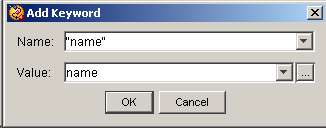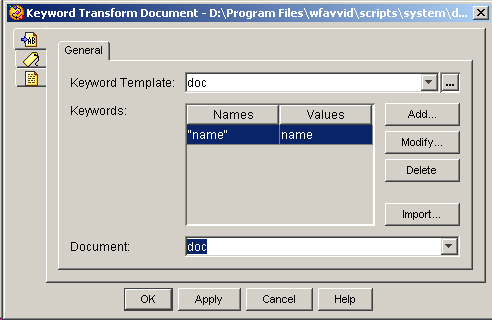The Keyword Transform Document Step
Add a Keyword Transform Document step to the hello.aef script to specify keywords in the file document that will be replaced with text in the dynamic web page by performing the following procedure.
Procedure
| Step 1 | From the Document palette, drag a Keyword Transform Document step to the Design pane, and then drop it over the Create File Document step icon. The Keyword Transform Document step icon appears in the Design pane. | ||
| Step 2 | Right-click the new Keyword Transform Document step icon. A popup menu appears. | ||
| Step 3 | In the popup menu, choose Properties. The Keyword Transform Document customizer window appears.  | ||
| Step 4 | From the Keyword Template drop-down menu, choose doc. This variable represents the sayhello.html template document, which contains the embedded keyword to be replaced. | ||
| Step 5 | From the Document drop-down menu, choose doc. This choice specifies that the completed document is stored back in the same variable. | ||
| Step 6 | Click Add. The Add Keyword dialog box appears.  | ||
| Step 7 | In the Name text field, enter “name”. | ||
| Step 8 | From the Local Variable drop-down menu, choose name. This choice specifies that the system supplies the correct String data type.
This choice specifies that name is the name of the keyword in the sayhello.html template, as shown below: | ||
| Step 9 | Click OK. The Add Keyword dialog box closes, and appears in the Keyword Transform Document customizer window.  | ||
| Step 10 | Click OK. The Keyword Transform Document customizer window closes, and the name of the source document variable appears next to the Keyword Transform Document step icon in the Design pane of the Cisco Unified CCX Editor. You are now ready to add the next step to the hello.aef script in the Design pane of the Cisco Unified CCX Editor. |